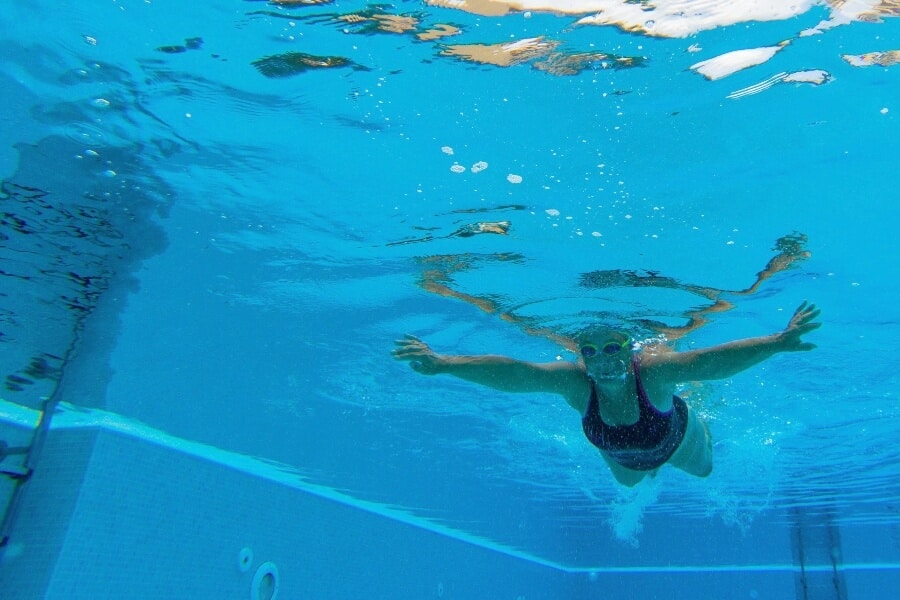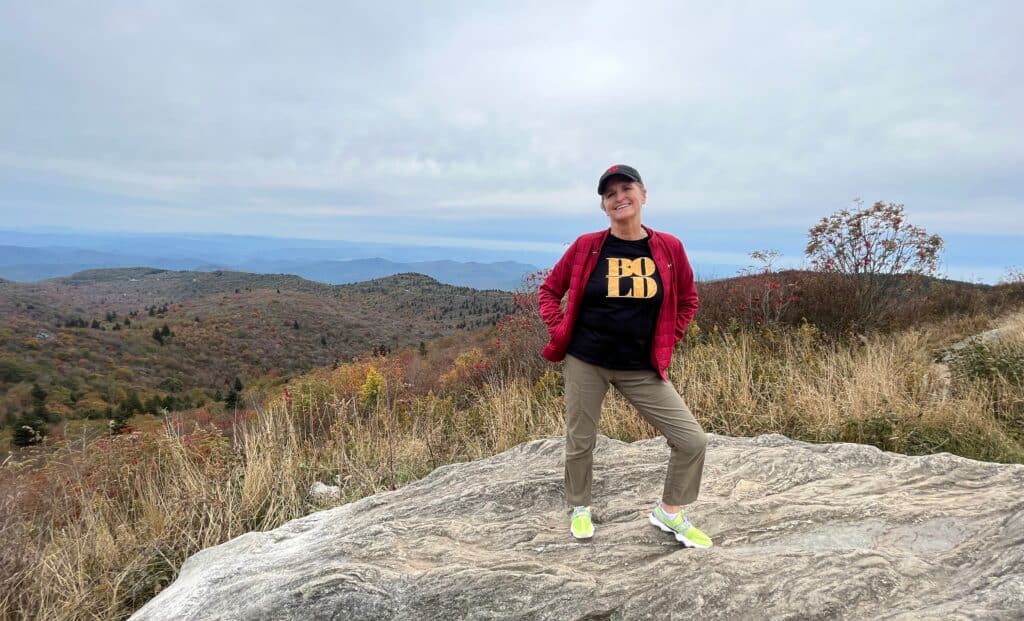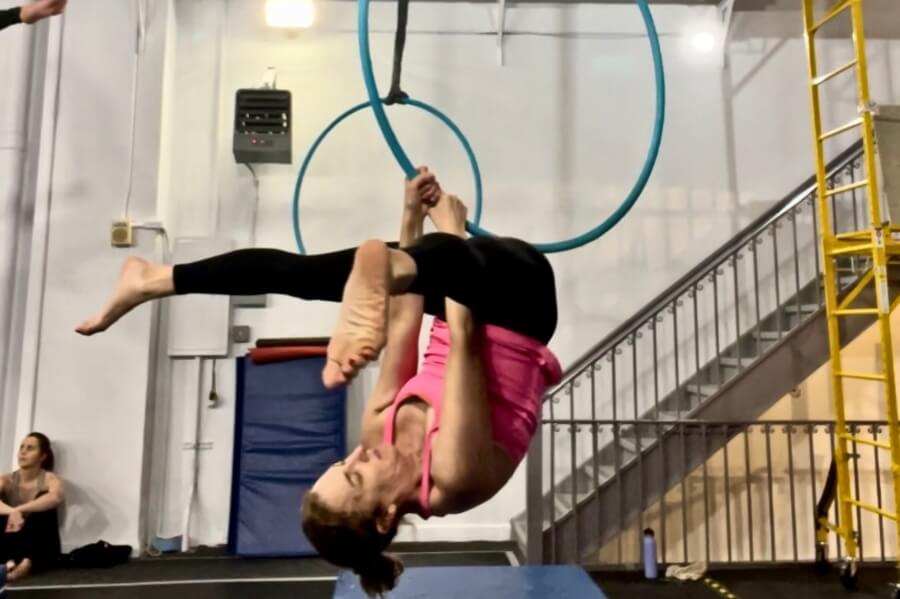I’m rushing down the pathway, late to my adult fitness swim class at the community college.
I see a man along the path, maybe a few years older than I am. He has a thready mustache that curves down to his chin on either side, with a thin empty line running from his nose to his upper lip. There’s a large, blurry tattoo on his left arm. He’s wearing baggy, low-slung jeans, and a gray, untucked t-shirt. He has a thick chain necklace with a large silver cross that lands mid-chest.
“Hey, how’s it going?” I say as we approach.
“Heeeeeeey,” he says. And then he slows, as if he expects me to stop and talk to him.
I instantly regret that I was friendly—that I had issued an invitation that I immediately want to pull back. I pick up my pace and keep my eyes fixed on the ground.
As we pass, he yells back, “I just registered for school. I’m going to turn my life around!”
“Okay, good for you,” I say, and keep walking.
And then I think, “Yeah. Good for him. It’s a good place to do that. I turned my life around here too, ten years ago.”
Read More: I Can’t Believe This is How My 29-Year Marriage Ends
How to Turn Your Life Around: One Stroke at a Time
Back then, my husband and I had split after 23 years together. He moved out on our wedding anniversary. That evening, he brought me a present—a silver bracelet.
I was a good swimmer—always had been—with the pool being the only place where my weight was neutral.
“Why do you think I’d want an anniversary gift?” I asked.
“Yeah, um, I didn’t know the protocol,” he said.
The next day, I went furniture shopping with him. I wanted our kids to have something that felt like “home” at their dad’s place too. After we arranged for the mattress delivery, I got in to my car and sobbed. I didn’t know the protocol either.
I quit work not too long after the divorce was final. Work was a nice distraction from the relentless depression, but I needed to be more proactive than mere distraction. To bring some structure to my now open days, I enrolled in a class at the community college, going back to the only activity I knew I loved—swimming.
Into the Deep End
I was nervous to go to the first swimming class, not because I was afraid of the water, but because I was terrified of the bathing suit. I weighed over 300 pounds at the time, which would be a lot of weight for anyone, but was an extra burden on my five-feet-three-inch frame. But I was a good swimmer—always had been—with the pool being the only place where my weight was neutral.
The swim coach was a few years younger than I was. He didn’t ask what a 40-year-old woman was doing among the class of teenagers, instead he treated me like any other co-ed.
The first day Coach needed to get a sense of everyone’s skill set. Did they put their face in the water when they swam? Were they comfortable swimmers? Competitive swimmers? I was one of the comfortable ones, with an easy, steady stroke. Coach seeded me in the third lane, next to the two lanes of fast swimmers. I was relieved to be in the anonymous middle.
After Coach had everyone sorted, he asked us to hop out so he could go over course expectations. The students all made their way to the side of the pool, pushed their arms up on the edge, and sprung out of the pool. I tried to do the same, but couldn’t lift myself and fell back in the water. I tried again. Same thing. And again. I was mortified, feeling publicly beached.
The Grace of a Stranger
Coach started talking to the group. “We start class right at noon. That means in the water at noon, so you’ll need to get here at least five minutes early so you have time to change.”
As I got more comfortable moving physically through the world, the rest of my life started to work itself out.
As he talked, he walked across the pool deck to retrieve a pool ladder, which was resting against the wall. It was a portable ladder, which looked like a hook-on boat ladder. At the first swim lane, he lowered the ladder into the pool and hooked it on the pool deck. He then walked across the deck to the white board, continuing to talk as he walked.
“You are allowed three absences a semester. After three, I start taking points off,“ Coach said. “If you’re not in the water at noon, I count that as a tardy. Two tardies count as an absence.” Coach wrote the number “2” on the white board.
He had placed himself so that the students’ backs were to the pool, as he continued to scribble on the white board. Nothing prepared, it seemed, just words like “swim” and “stroke”.
With the students’ eyes locked on Coach’s scribblings, I hopped through the water over to the ladder and climbed out, then snuck around to the back of the group.
After class, Coach came up to me. “You’re a good swimmer,” he said.
“Thank you,” I said, “I’m excited about the class.” That was both true and untrue. I was excited, and I was humiliated.
“Hey, if you go to the corner of the pool and throw one leg up on the deck, it’ll be easier to pull yourself out. The pool will be open tomorrow if you want to give it a shot,” he said.
I wanted to say, “Can I hug you? Can I cry?” But instead simply said, “Oh yeah, thanks.”
Working on My Exit
The next day, I was at the pool when it opened. There was a student lifeguard, but otherwise the pool was empty.
I wish I could have offered this stranger the same support Coach had so kindly given me.
“I know this will seem weird, but I’m going to practice getting in and out of the pool,” I said to the lifeguard.
“Okay?” the lifeguard said.
Coach was right. I was able to get in the corner, reach my right leg up to the lip of the pool, pull myself up and over, almost rolling out of the pool. It wasn’t graceful, but I could do it. I must have practiced 20 times that day, while the student lifeguard watched.
On Wednesday, before Coach had a chance to grab the ladder, I hopped to the pool corner, lifted my leg to the pool lip, and rolled myself out of the pool. No one was even looking my way, though I’m sure they noticed I was out of the pool and wondered how I got there.
After class, as I walked out of the locker room, Coach said, “Good job, Lucie. You’re working hard.”
He must have known that I had practiced his suggestion. “Thank you,” I said. “Really. Thank you.”
Over the course of the semester, I became stronger—yes, a stronger swimmer, but also stronger in general. As I got more comfortable moving physically through the world, the rest of my life started to work itself out.
By the end of the year, my kids were doing well, and I was physically and emotionally healthier. I had even opened a boutique with a friend, and was well on my way to a new life.
I thought about how Coach’s kindness had been the grace I needed to move forward—to build confidence in myself and to trust again. I wrote him a long letter of appreciation, but never sent it. I feared it read like a love letter.
Trying Again
I wish I could go back and re-do the conversation with the man I saw as I was rushing to swim class a few weeks ago. Just a small tweak, really, to offer this stranger the same support Coach had so kindly given me.
“Hey, how’s it going?” I’d say as we approached.
“Heeeeeeey,” he’d reply.
I’d look him square in the eye.
“I just registered for school. I’m going to turn my life around!” he’d tell me.
“Good for you. I turned my life around at this place, and I know you can do it too. Good for you.”
Read More: My Answer to a Frustrating, Demoralizing Search for a New Job? Go Climb a Mountain





















0 Comments